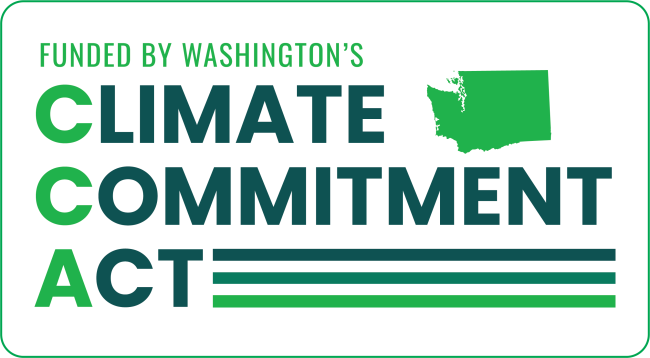Transit Coordination
This grant program provides financial assistance for coordinated transit-related projects. The program encourages joint planning and coordination by central Puget Sound transit systems to improve user experience and increase ridership while making the most effective use of tax dollars.
This grant is supported by state funding from Washington’s Climate Commitment Act (CCA) (100 percent). The CCA supports Washington’s climate action efforts by putting cap-and-invest dollars to work reducing climate pollution, creating jobs, and improving public health. Information about the CCA is available at www.climate.wa.gov.

Available funding
The 2025 Legislature didn’t allocate funding for the 2025-2027 Transit Coordination grant program.
The following information highlights the main program elements and lists previous projects funded from this program.
Eligible applicants
Transit agencies located in a county or counties with a population of 700,000 or more that border Puget Sound (i.e., King County Metro, Everett Transit, Sound Transit, Community Transit, Pierce Transit).
At least two eligible transit agencies must jointly propose an application. Applications must clearly define the roles and responsibilities of each partnering agency.
Eligible projects
Eligible projects include, but are not limited to:
- Integrating marketing efforts.
- Aligning fare structures.
- Integrating service planning.
- Coordinating long-range planning, including capital projects planning and implementation.
- Integrating other administrative functions and internal business processes, as appropriate.
- Integrating certain customer-focused tools and initiatives.
Match requirements
Applicants must provide matching funds in the amount of 10 percent of their total project cost. In-kind match for planning and coordination activities is eligible. Cash match is required for capital purchases (e. g., software) that support the implementation of planning activities.
Applicants may use any funding source other than competitive state public transportation grants as match.
Evaluation criteria
An independent review panel evaluates applications based on the following criteria:
| Evaluation criteria | Max points |
|---|---|
| Impact on service | 20 |
| Impact on customer service | 15 |
| Impact on administration/efficiencies | 15 |
| Joint planning/coordination | 15 |
| Readiness to proceed | 15 |
| Transferability | 10 |
| Innovation | 10 |
| Total points possible | 100 |
WSDOT will prioritize eligible projects that propose to promote the formation of joint partnerships between transit agencies or merge service delivery across agencies over applications that propose traditional project types.
Awards
The Transit Coordination Grant table below shows two projects awarded $2 million from the 2023-2025 transportation budget. The 2024 supplemental budget awarded $290 thousand for two additional projects.
| Lead organization | Partner organizations | Project description | Project area | Award |
|---|---|---|---|---|
| Central Puget Sound Regional Transit Authority | Community Transit, Everett Transit, Kitsap Transit, King County Metro, Pierce Transit | ORCA & ORCA LIFT enhancements | King, Kitsap, Pierce, Snohomish | $1,700,000 |
| Jefferson Transit | Clallam Transit System, Jefferson County | Facilitating access to the Washington State Ferry docks in Kingston and Bainbridge Island | Clallam, Jefferson, Kitsap | $90,000* |
| King County Metro | Community Transit, Everett Transit, Kitsap Transit, Pierce Transit, Sound Transit, Seattle Department of Transportation, Washington State Ferries | Free youth transit pass regional campaign | King, Kitsap, Pierce, Snohomish | $300,000 |
| King County Metro | Community Transit, Everett Transit, Kitsap Transit, Pierce Transit, City of Seattle, Sound Transit, Washington State Ferries | Expansion of free youth transit pass regional campaign | King, Kitsap, Pierce, Snohomish | $200,000* |
*Indicates a project funded with 2024 supplemental funds.
Sign up for grant updates
To stay informed about WSDOT public transportation grants, you can register in GovDelivery.
Slow down – lives are on the line.
Excessive speed was a top cause of work zone collisions in 2024.
Phone down, eyes up.
Work zones need our undivided attention.
It's in EVERYONE’S best interest.
96% of people hurt in work zones are drivers, their passengers or passing pedestrians, not just our road crews.
